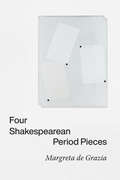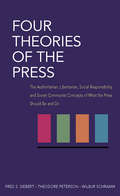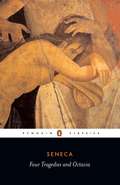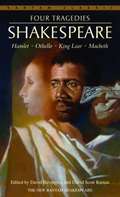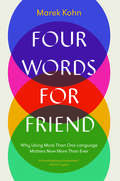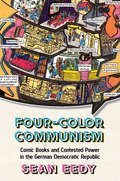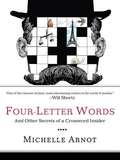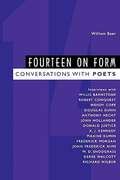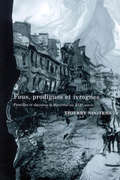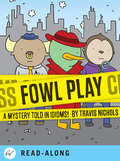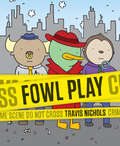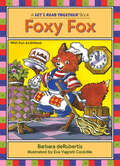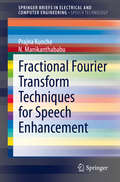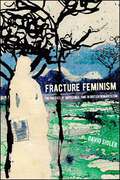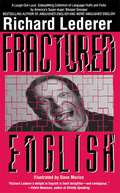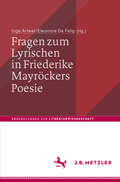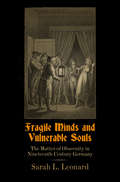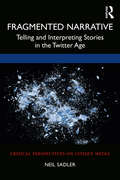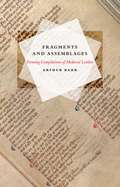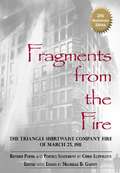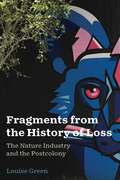- Table View
- List View
Four Shakespearean Period Pieces
by Margreta de GraziaIn the study of Shakespeare since the eighteenth century, four key concepts have served to situate Shakespeare in history: chronology, periodization, secularization, and anachronism. Yet recent theoretical work has called for their reappraisal. Anachronisms, previously condemned as errors in the order of time, are being hailed as alternatives to that order. Conversely chronology and periods, its mainstays, are now charged with having distorted the past they have been entrusted to represent, and secularization, once considered the driving force of the modern era, no longer holds sway over the past or the present. In light of this reappraisal, can Shakespeare studies continue unshaken? This is the question Four Shakespearean Period Pieces takes up, devoting a chapter to each term: on the rise of anachronism, the chronologizing of the canon, the staging of plays “in period,” and the use of Shakespeare in modernity’s secularizing project. To read these chapters is to come away newly alert to how these fraught concepts have served to regulate the canon’s afterlife. Margreta de Grazia does not entirely abandon them but deftly works around and against them to offer fresh insights on the reading, editing, and staging of the author at the heart of our literary canon.
Four Theories of the Press: The Authoritarian, Libertarian, Social Responsibility, and Soviet Communist Concepts of What the Press Should Be and Do (Essay Index Reprint Ser.)
by Fred Siebert Theodore Peterson Wilbur SchrammPresented here are four major theories behind the functioning of the world's presses: (1) the Authoritarian theory, which developed in the late Renaissance and was based on the idea that truth is the product of a few wise men; (2) the Libertarian theory, which arose from the works of men like Milton, Locke, Mill, and Jefferson and avowed that the search for truth is one of man's natural rights; (3) the Social Responsibility theory of the modern day: equal radio and television time for political candidates, the obligations of the newspaper in a one-paper town, etc.; (4) the Soviet Communist theory, an expanded and more positive version of the old Authoritarian theory.
Four Tragedies and Octavia
by SenecaBased on the legends used in Greek drama, Seneca's plays are notable for the exuberant ruthlessness with which disastrous events are foretold and then pursued to their tragic and often bloodthirsty ends. Thyestes depicts the menace of an ancestral curse hanging over two feuding brothers, while Phaedra portrays a woman tormented by fatal passion for her stepson. In The Trojan Women, the widowed Hecuba and Andromache await their fates at the hands of the conquering Greeks, and Oedipus follows the downfall of the royal House of Thebes. Octavia is a grim commentary on Nero's tyrannical rule and the execution of his wife, with Seneca himself appearing as an ineffective counsellor attempting to curb the atrocities of the emperor.
Four Tragedies: Hamlet, Othello, King Lear, Macbeth
by William Shakespeare David Bevington David Scott KastanThe greatest works of tragedy from the Bard, this book features "Hamlet," "Othello," "King Lear" and "Macbeth."
Four Words for Friend: Why Using More Than One Language Matters Now More Than Ever
by Marek KohnA compelling argument about the importance of using more than one language in today’s world In a world that has English as its global language and rapidly advancing translation technology, it’s easy to assume that the need to use more than one language will diminish—but Marek Kohn argues that plural language use is more important than ever. In a divided world, it helps us to understand ourselves and others better, to live together better, and to make the most of our various cultures. Kohn, whom the Guardian has called “one of the best science writers we have,” brings together perspectives from psychology, evolutionary thought, politics, literature, and everyday experience. He explores how people acquire languages; how they lose them; how they can regain them; how different languages may affect people’s perceptions, their senses of self, and their relationships with each other; and how to resolve the fundamental contradiction of languages, that they exist as much to prevent communication as to make it happen.
Four-Color Communism: Comic Books and Contested Power in the German Democratic Republic
by Sean EedyAs with all other forms of popular culture, comics in East Germany were tightly controlled by the state. Comics were employed as extensions of the regime’s educational system, delivering official ideology so as to develop the “socialist personality” of young people and generate enthusiasm for state socialism. The East German children who avidly read these comics, however, found their own meanings in and projected their own desires upon them. Four-Color Communism gives a lively account of East German comics from both perspectives, showing how the perceived freedoms they embodied created expectations that ultimately limited the regime’s efforts to bring readers into the fold.
Four-Color Communism: Comic Books and Contested Power in the German Democratic Republic
by Sean EedyAs with all other forms of popular culture, comics in East Germany were tightly controlled by the state. Comics were employed as extensions of the regime’s educational system, delivering official ideology so as to develop the “socialist personality” of young people and generate enthusiasm for state socialism. The East German children who avidly read these comics, however, found their own meanings in and projected their own desires upon them. Four-Color Communism gives a lively account of East German comics from both perspectives, showing how the perceived freedoms they embodied created expectations that ultimately limited the regime’s efforts to bring readers into the fold.
Four-Letter Words
by Michelle ArnotCrossword puzzle expert and champion Michelle Arnot has complied this irresistibly fun and entertaining manual filled with fascinating facts, puzzle miscellany, and surefire tips for puzzle solving. For devoted daily puzzlers, casual solvers, and fearless crossword warriors alike, this book offers insights into the addictive world of crossword puzzles including: • Insider secrets, techniques, and tips • Obscure four-letter words for scoring big points • Advanced strategies of competitive puzzlers • Inside stories of eccentric players and all-time champions of the grids • Trivia, lore, and the lingo of crosswording .
Fourteen On Form: Conversations With Poets
by Martha H. Swain William BaerFourteen on Form: Conversations with Poets by William Baer. Interviews with Willis Barnstone, Robert Conquest, Wendy Cope, Douglas Dunn, Anthony Hecht, John Hollander, Donald Justice, X. J. Kennedy, Maxine Kumin, Frederick Morgan, John Frederick Nims, W. D. Snodgrass, Derek Walcott, and Richard Wilbur. When free verse and its many movements seemed to dominate poetry, other writers worked steadfastly, insistently, and majestically in traditional forms of rhyme and meter. Such poets as Anthony Hecht, Donald Justice, Derek Walcott, and Richard Wilbur utilized sonnets, villanelles, blank verse, and many other forms to create dazzling, lasting work. Their writing posed a counterpoint to free verse, sustained a tradition in English language verse, and eventually inspired the movement called New Formalism. Fourteen on Form: Conversations with Poets collects interviews with some of the most influential poets of the last fifty years. William Baer, editor of The Formalist, asks incisive questions that allow writers to discuss in detail a wide range of topics related to their work, methods of composition, and the contemporary poetry scene. Maxine Kumin reflects on being a woman poet during a period in which women were not encouraged to submit to journals. With clarity and passion, Walcott remembers the impetus of his famous "Eulogy to W. H. Auden." British poet Wendy Cope talks about the differences between how her barbed poems are received in England and abroad. The conversations return continually to the serious matter of poetic craft, especially the potential power of form in poetry. These well-paced conversations showcase poets discussing their creative lives with insight and candor. The sum total of their forthright opinions in Fourteen on Form not only elucidates the current situation of the art form, but it also serves as a primer for understanding the fundamental craft of poetics. William Baer is a professor of English at the University of Evansville and the editor of The Formalist. He edited Elia Kazan: Interviews and Conversations with Derek Walcott, both published by University Press of Mississippi.
Fous, prodigues et ivrognes: Familles et déviance à Montréal au XIXe siècle (Studies on the History of Quebec/Études d'histoire du Québec #20)
by Thierry NootensÀ travers l’analyse de près de 500 procédures d’interdiction engagées entre 1820 et 1895, Fous, prodigues et ivrognes examine les interactions entre les acteurs impliqués dans la régulation de la déviance : familles, système judiciaire, institutions asilaires et médecins. Tournant le dos à l’approche institutionnelle classique, Thierry Nootens considère la famille – et non l’État, la profession médicale ou l’asile – comme le lieu principal de définition et de régulation des diverses formes de déviance.
Fowl Play: A Mystery Told in Idioms!
by Travis NicholsJust what kind of monkey business has befallen Mr. Hound's shop? Luckily, our team of plucky detectives has been chomping at the bit to take on their first case. When Mr. Hound hires them to investigate, they hoof it to his shop. And once they get sleuthing, wild horses couldn't drag them away from the scent of a clue. But is it all just a dog and pony show to distract them from the truth? Idioms are everywhere in this hilarious first case of the Gumshoe Zoo detective agency as they attempt to solve Mr. Hound's mystery. Early readers will love the multi-paneled comic book hybrid feel of this raucous adventure as the detectives manage to keep a straight face, collar some suspects, and solve a mystery, all while avoiding beating a dead—never mind. Plus, this is the fixed format version, which will look almost identical to the print version. Additionally for devices that support audio, this ebook includes a read-along setting.
Fowl Play: A Mystery Told in Idioms!
by Travis NicholsMeet the Gumshoe Zoo detectives! &“This enjoyable introduction to idiomatic speech gives lots of laughs, a mystery to solve, and a funny cliff-hanger.&” —School Library Journal Just what kind of monkey business has befallen Mr. Hound&’s shop? Luckily, our team of plucky detectives has been chomping at the bit to take on their first case. When Mr. Hound hires them to investigate, they hoof it to his shop. And once they get sleuthing, wild horses couldn&’t drag them away from the scent of a clue. But is it all just a dog and pony show to distract them from the truth? Idioms are everywhere in this hilarious first case of the Gumshoe Zoo detective agency as they attempt to solve Mr. Hound&’s mystery. Early readers will love the multi-paneled comic book hybrid feel of this raucous adventure as the detectives manage to keep a straight face, collar some suspects, and solve a mystery, all while avoiding beating a dead—never mind. &“Nichols goes hog wild in a goofball detective story bursting with animal-themes idioms . . . A highly entertaining comic mystery.&” —Publishers Weekly &“Idioms get a run for their money in this good-humored and stimulating piece of wordplay from Nichols . . . Amusing to the point of provoking an inquiry. Really, it&’s the bee&’s knees.&” —Kirkus Reviews &“Give this to a kid who enjoys puzzles and witty turns of phrase.&” —Shelf Awareness &“Packed with learning and gobs of fun.&” —Books to Borrow, Books to Buy &“An awesome book to teach the differences between the literal and the figurative.&” —Books and Whatnot
Foxy Fox: Short Vowel O (Let's Read Together ®)
by Barbara deRubertisLet&’s Read Together books merge rhyme and vowel sounds in delightfully zany stories kids will want to read again and again. Each of the 15 books in this classic series by award-winning author/educator Barbara deRubertis will give your child a jumpstart on reading success."Story lines are silly and inventive, and recall Dr. Seuss&’s Cat in the Hat for the building of rhythm and rhyming words." —School Library JournalFoxy Fox drops the pot and slops the mop. Will he lose his job at Mom and Po's shop? (This easy-to-read story features the short &“o&” vowel sound.)
Fractional Fourier Transform Techniques for Speech Enhancement (SpringerBriefs in Speech Technology)
by Prajna Kunche N. ManikanthababuThis book explains speech enhancement in the Fractional Fourier Transform (FRFT) domain and investigates the use of different FRFT algorithms in both single channel and multi-channel enhancement systems, which has proven to be an ideal time frequency analysis tool in many speech signal processing applications. The authors discuss the complexities involved in the highly non- stationary signal processing and the concepts of FRFT for speech enhancement applications. The book explains the fundamentals of FRFT as well as its implementation in speech enhancement. Theories of different FRFT methods are also discussed. The book lets readers understand the new fractional domains to prepare them to develop new algorithms. A comprehensive literature survey regarding the topic is also made available to the reader.
Fracture Feminism: The Politics of Impossible Time in British Romanticism (SUNY series, Studies in the Long Nineteenth Century)
by David SiglerFeminist writers in British Romanticism often developed alternatives to linear time. Viewing time as a system of social control, writers like Mary Wollstonecraft, Anna Barbauld, and Mary Shelley wrote about current events as if they possessed knowledge from the future. Fracture Feminism explores this tradition with a perspective informed by Lacanian psychoanalysis and Derridean deconstruction, showing how time can be imagined to contain a hidden fracture—and how that fracture, when claimed as a point of view, could be the basis for an emancipatory politics. Arguing that the period's most radical experiments in undoing time stemmed from the era's discourses of gender and women's rights, Fracture Feminism asks: to what extent could women "belong" to their historical moment, given their political and social marginalization? How would voices from the future interrupt the ordinary procedures of political debate? What if utopia were understood as a time rather than a place, and its time were already inside the present?
Fracture and Fragmentation in British Romanticism
by Alexander RegierWhat associates fragmentation with Romanticism? In this book, Alexander Regier explains how fracture and fragmentation form a lens through which some central concerns of Romanticism can be analysed in a particularly effective way. These categories also supply a critical framework for a discussion of fundamental issues concerning language and thought in the period. Over the course of the volume, Regier discusses fracture and fragmentation thematically and structurally, offering new readings of Wordsworth, Kant, Burke, Keats, and De Quincey, as well as analysing central intellectual presuppositions of the period. He also highlights Romanticism's importance for contemporary scholarship, especially in the writings of Benjamin and de Man. More generally, Regier's discussion of fragmentation exposes a philosophical problem that lies behind the definition of Romanticism.
Fragen zum Lyrischen in Friederike Mayröckers Poesie (Abhandlungen zur Literaturwissenschaft)
by Inge Arteel Eleonore De FelipFriederike Mayröcker zählt zu den herausragenden lyrischen Stimmen der Gegenwart. Der vorliegende Band bietet Annäherungen an ihr lyrisches Werk. Entstanden im Laufe von mehr als 70 Schaffensjahren, spiegelt es die Entwicklung einer Einzelgängerin von ihren Anfängen in den letzten Kriegsjahren durch die Zeit der formalen Experimente in den 1960er und 1970er Jahren bis hin zu ihrem sogenannten Spätwerk. Mayröckers Poetik zeichnet sich durch ein komplexes System an intertextuellen und -medialen Bezügen, an Fremd- und Selbstzitaten, an motivischen Fortführungen und Variationen aus. Zugleich entziehen sich ihre Gedichte der interpretativen Entschlüsselung und Fixierung. - Durch innovative Perspektivierungen und neue Erkenntnisse kommen die hier versammelten Analysen der sprachlichen Kraft, formalen Kühnheit und emotionalen Tiefe von Mayröckers Gedichten auf die Spur. Die Beiträge widmen sich insbesondere Mayröckers jüngsten Bänden, ihrem Dialog mit Hölderlin sowie auch grundsätzlichen lyrikologischen Fragestellungen.
Fragile Minds and Vulnerable Souls: The Matter of Obscenity in Nineteenth-Century Germany (Material Texts)
by Sarah L. LeonardFragile Minds and Vulnerable Souls investigates the creation of "obscene writings and images" as a category of print in nineteenth-century Germany. Sarah L. Leonard charts the process through which texts of many kinds—from popular medical works to stereoscope cards—were deemed dangerous to the intellectual and emotional lives of vulnerable consumers. She shows that these definitions often hinged as much on the content of texts as on their perceived capacity to distort the intellect and inflame the imagination.Leonard tracks the legal and mercantile channels through which sexually explicit material traveled as Prussian expansion opened new routes for the movement of culture and ideas. Official conceptions of obscenity were forged through a heterogeneous body of laws, police ordinances, and expert commentary. Many texts acquired the stigma of immorality because they served nonelite readers and passed through suspect spaces; books and pamphlets sold by peddlers or borrowed from fly-by-night lending libraries were deemed particularly dangerous. Early on, teachers and theologians warned against the effects of these materials on the mind and soul; in the latter half of the century, as the study of inner life was increasingly medicalized, physicians became the leading experts on the detrimental side effects of the obscene. In Fragile Minds and Vulnerable Souls, Leonard shows how distinctly German legal and medical traditions of theorizing obscenity gave rise to a new understanding about the mind and soul that endured into the next century.
Fragmented Narrative: Telling and Interpreting Stories in the Twitter Age (Critical Perspectives on Citizen Media)
by Neil SadlerWith the rise and rise of social media, today’s communication practices are significantly different from those of even the recent past. A key change has been a shift to very small units, exemplified by Twitter and its strict 240-character limit on individual posts. Consequently, highly fragmented communication has become the norm in many contexts. Fragmented Narrative sets out to explore the production and reception of fragmentary stories, analysing the Twitter-based narrative practices of Donald Trump, the Spanish political movement Podemos, and Egyptian activists writing in the context of the 2013 military intervention in Egypt. Sadler draws on narrative theory and hermeneutics to argue that narrative remains a vital means for understanding, allowing fragmentary content to be grasped together as part of significant wholes. Using Heideggerian ontology, he proposes that our capacity to do this is grounded in the centrality of narrative to human existence itself. The book strives to provide a new way of thinking about the interpretation of fragmentary information, applicable both to social media and beyond. Contributing to the emerging literature in existential media studies, this timely volume will interest students, scholars and researchers of narrative, new media and language and communication studies.
Fragments and Assemblages: Forming Compilations of Medieval London
by Arthur BahrIn Fragments and Assemblages, Arthur Bahr expands the ways in which we interpret medieval manuscripts, examining the formal characteristics of both physical manuscripts and literary works. Specifically, Bahr argues that manuscript compilations from fourteenth-century London reward interpretation as both assemblages and fragments: as meaningfully constructed objects whose forms and textual contents shed light on the city's literary, social, and political cultures, but also as artifacts whose physical fragmentation invites forms of literary criticism that were unintended by their medieval makers. Such compilations are not simply repositories of data to be used for the reconstruction of the distant past; their physical forms reward literary and aesthetic analysis in their own right. The compilations analyzed reflect the full vibrancy of fourteenth-century London's literary cultures: the multilingual codices of Edwardian civil servant Andrew Horn and Ricardian poet John Gower, the famous Auchinleck manuscript of texts in Middle English, and Chaucer's Canterbury Tales. By reading these compilations as both formal shapes and historical occurrences, Bahr uncovers neglected literary histories specific to the time and place of their production. The book offers a less empiricist way of interpreting the relationship between textual and physical form that will be of interest to a wide range of literary critics and manuscript scholars.
Fragments and Assemblages: Forming Compilations of Medieval London
by Arthur BahrIn Fragments and Assemblages, Arthur Bahr expands the ways in which we interpret medieval manuscripts, examining the formal characteristics of both physical manuscripts and literary works. Specifically, Bahr argues that manuscript compilations from fourteenth-century London reward interpretation as both assemblages and fragments: as meaningfully constructed objects whose forms and textual contents shed light on the city’s literary, social, and political cultures, but also as artifacts whose physical fragmentation invites forms of literary criticism that were unintended by their medieval makers. Such compilations are not simply repositories of data to be used for the reconstruction of the distant past; their physical forms reward literary and aesthetic analysis in their own right. The compilations analyzed reflect the full vibrancy of fourteenth-century London’s literary cultures: the multilingual codices of Edwardian civil servant Andrew Horn and Ricardian poet John Gower, the famous Auchinleck manuscript of texts in Middle English, and Chaucer’s Canterbury Tales. By reading these compilations as both formal shapes and historical occurrences, Bahr uncovers neglected literary histories specific to the time and place of their production. The book offers a less empiricist way of interpreting the relationship between textual and physical form that will be of interest to a wide range of literary critics and manuscript scholars.
Fragments from the Fire: The Triangle Shirtwaist Company Fire of March 25, 1911
by Chris Llewellyn Michelle GaffeyThe Triangle Shirtwaist Company manufactured blouses for women and was located on the eighth, ninth, and tenth floors of the Asch Building, at the corner of Washington Place and Greene Street, in New York City's Washington Square.The company employed up to 900 workers at a time, but on March 25, 1911, only about 500 were present. These were immigrants, most of whom could not speak the English language. Nearly all were female, primarily Russian or Italian, although twelve nationalities were known to be ''on the books.'' At about 4:45 p.m., just after pay envelopes had been distributed, a fire broke out. Not everyone was able to reach the elevators and stairways. On the ninth floor, because the bosses had kept the doors locked to keep out union organizers, workers were forced to jump from windows. One hundred forty-six people, some as young as fourteen, perished. In 1987, Chris Llewellyn chronicled the Triangle Fire and its aftermath in her award-winning, polyvocal book of poems, Fragments from the Fire. Now, 105 years after the Fire, Fragments is in print once again. With poetic and documentary impulses, Fragments speaks to the deplorable working conditions that characterize the garment industry in this new millennium as it continues to commemorate the Triangle Fire of March 25, 1911. Winner of the Walt Whitman Award for 1986, this is a revised 30th anniversary edition of that book which was originally published by Viking Press in 1987 and again in "Steam Dummy & Fragments from the Fire" by Bottom Dog Press in 1993.
Fragments from the History of Loss: The Nature Industry and the Postcolony (AnthropoScene)
by Louise GreenThe Anthropocene’s urgent message about imminent disaster invites us to forget about history and to focus on the present as it careens into an unthinkable future. To counter this, Louise Green engages with the theoretical framing of nature in concepts such as the “Anthropocene,” “the great acceleration,” and “rewilding” in order to explore what the philosophy of nature in the era of climate change might look like from postcolonial Africa.Utilizing a practice of reading developed in the Frankfurt school, Green rearranges narrative fragments from the “global nature industry,” which subjugates all aspects of nature to the logic of capitalist production, in order to disrupt preconceived notions and habitual ways of thinking about how we inhabit the Anthropocene. Examining climate change through the details of everyday life, particularly the history of conspicuous consumption and the exploitation of Africa, she surfaces the myths and fantasies that have brought the world to its current ecological crisis and that continue to shape the narratives through which it is understood. Beginning with African rainforest exhibits in New York and Cornwall, Green discusses how these representations of the climate catastrophe fail to acknowledge the unequal pace at which humans consume and continue to replicate imperial narratives about Africa. Examining this history and climate change through the lens of South Africa’s entry into capitalist modernity, Green argues that the Anthropocene redirects attention away from the real problem, which is not human’s relation with nature, but people’s relations with each other.A sophisticated, carefully argued call to rethink how we approach relationships between and among humans and the world in which we live, Fragments from the History of Loss is a challenge to both the current era and the scholarly conversation about the Anthropocene.
Fragments from the History of Loss: The Nature Industry and the Postcolony (AnthropoScene: The SLSA Book Series #5)
by Louise GreenThe Anthropocene’s urgent message about imminent disaster invites us to forget about history and to focus on the present as it careens into an unthinkable future. To counter this, Louise Green engages with the theoretical framing of nature in concepts such as the "Anthropocene," "the great acceleration," and "rewilding" in order to explore what the philosophy of nature in the era of climate change might look like from postcolonial Africa.Utilizing a practice of reading developed in the Frankfurt school, Green rearranges narrative fragments from the "global nature industry," which subjugates all aspects of nature to the logic of capitalist production, in order to disrupt preconceived notions and habitual ways of thinking about how we inhabit the Anthropocene. Examining climate change through the details of everyday life, particularly the history of conspicuous consumption and the exploitation of Africa, she surfaces the myths and fantasies that have brought the world to its current ecological crisis and that continue to shape the narratives through which it is understood. Beginning with African rainforest exhibits in New York and Cornwall, Green discusses how these representations of the climate catastrophe fail to acknowledge the unequal pace at which humans consume and continue to replicate imperial narratives about Africa. Examining this history and climate change through the lens of South Africa’s entry into capitalist modernity, Green argues that the Anthropocene redirects attention away from the real problem, which is not human’s relation with nature, but people’s relations with each other.A sophisticated, carefully argued call to rethink how we approach relationships between and among humans and the world in which we live, Fragments from the History of Loss is a challenge to both the current era and the scholarly conversation about the Anthropocene.
